《剑桥少儿英语一级》备考知识点
剑桥少儿英语第一册重点掌握内容
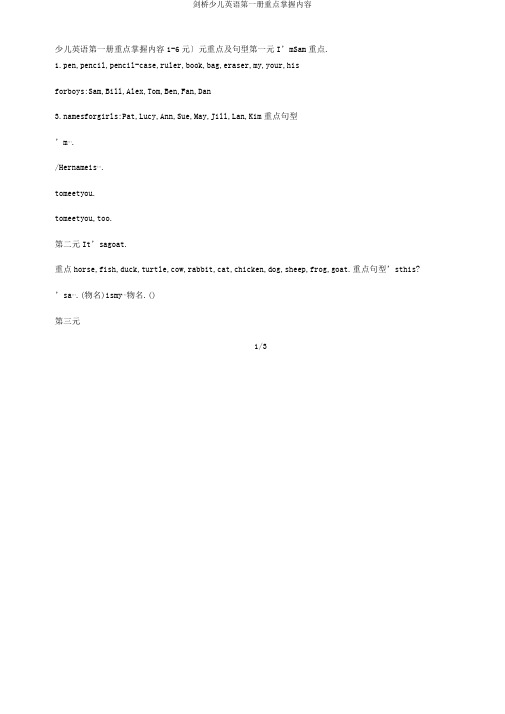
少儿英语第一册重点掌握内容1-6元〕元重点及句型第一元I’mSam重点.1.pen,pencil,pencil-case,ruler,book,bag,eraser,my,your,hisforboys:Sam,Bill,Alex,Tom,Ben,Fan,Dansforgirls:Pat,Lucy,Ann,Sue,May,Jill,Lan,Kim重点句型’m⋯./Hernameis⋯.tomeetyou.tomeetyou,too.第二元It’sagoat.重点horse,fish,duck,turtle,cow,rabbit,cat,chicken,dog,sheep,frog,goat.重点句型’sthis?’sa⋯.(物名)ismy⋯物名.()第三元1/3Ilikeapples.重点apples,bananas,pears,grapes,mangos,grapefruits,oranges,pineapples,watermelons,peaches,coconuts,le mons重点句型wouldyoulike,sir/Miss?wantsome⋯.youlikeanapple?Yes,please/No,thanks.youare.5.Me,too.第四元What’sinmyhat重点hat,turtle,table,pig,friend,clock,fish,baseball,bird,pen,pouch,Tony,fun,time重点句型’sinmyhat?’sonthetable?metry.ismyfriend,Tony.第五元Mybodyandthemonster’s重点2/3Nouns:hair,eye,ear,neck,hand,foot,head,nose,mouth,arm,leg;Verbs:see,smell,hear,taste,touch,clap,h old,pick,write,catch,stand,run,kick,stamp,hop,jump重点句型’sgotthreeeyes,fourhands,fourearsandthreelegs.yourhead.canwedowithourhandsandfeet?canyousee?Icanseeabook.Wecanseewithoureyes.第六元Let’splaygames.draw,throw,catch,hide,pick,kick,put,bouncetheball,kicktheshuttlecock,throwthebeanbag,catchthebean bag,hideandseek,pickandput?重点句型is⋯?mustbeinthe⋯.anappleandputitunderthechair.3/3。
剑桥少儿英语一年级知识点总结精编WORD版

剑桥少儿英语一年级知识点总结精编W O R D版IBM system office room 【A0816H-A0912AAAHH-GX8Q8-GNTHHJ8】剑桥少儿英语一级日常复习内容Unit13交际用语(会读,会对话)Please come and show us your paper clothes.请来给我们看你们的纸衣服。
This is my T-shirt. 这是我的T恤衫。
These are my shorts. 这些是我的短裤。
Is that yours? 那是你的吗?Yes, this is mine. 是的,这是我的。
It’s beautiful. 它是漂亮的。
Which one is different? 哪个是不同的?重点单词(会说、会读、会默写、能理解词意)clothes衣服these这些yours你的,你们的mine 我的hers她的glasses眼镜trousers裤子三会单词(会说、会读、能理解词意)paper纸group组shorts短裤chick小鸡chocolate巧克力chess象棋chin下巴cheese干酪different不同的vest背心thing东西语法知识形容词性物主代词 my我的 your你的,你们的 her她的 his他的 our我们的名词性物主代词 mine我的 yours你的,你们的 hers她的 his 他的 ours我们的形容词性物主代词 + 名词=名词性物主代词 (例)This is my dress.=This is mine. Trousers glasses shorts 等词为复数名词,表达时要用They are 或these are剑桥少儿英语一级日常复习内容Unit14交际用语(会读,会对话)Whatis he doing?他正在做什么?He is mopping the floor. 他正在拖地。
Here we are. 我们来了。
剑桥少儿英语一级知识点总结
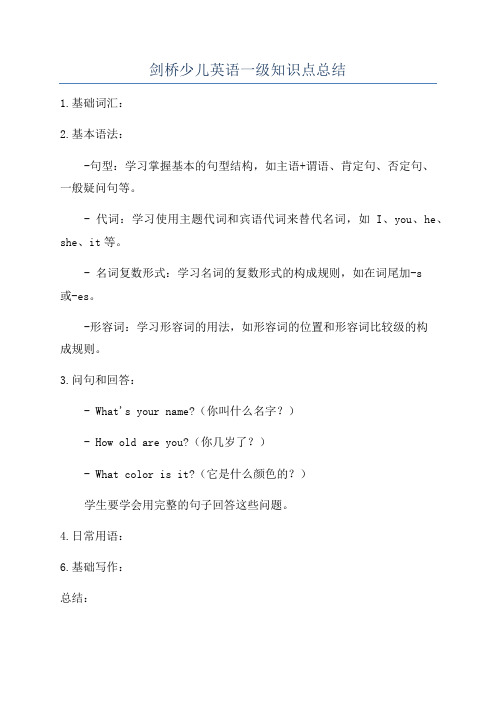
剑桥少儿英语一级知识点总结
1.基础词汇:
2.基本语法:
-句型:学习掌握基本的句型结构,如主语+谓语、肯定句、否定句、
一般疑问句等。
- 代词:学习使用主题代词和宾语代词来替代名词,如I、you、he、she、it等。
- 名词复数形式:学习名词的复数形式的构成规则,如在词尾加-s
或-es。
-形容词:学习形容词的用法,如形容词的位置和形容词比较级的构
成规则。
3.问句和回答:
- What's your name?(你叫什么名字?)
- How old are you?(你几岁了?)
- What color is it?(它是什么颜色的?)
学生要学会用完整的句子回答这些问题。
4.日常用语:
6.基础写作:
总结:。
剑桥少儿英语一级必须掌握的内容

剑桥少儿英语一级必须掌握的内容上册Unit One基本句型: Hello , your name, please? This is my new book.Hi ! I’m Pat.His name is Bill.Bill is my friend. Nice to see you .Show me your pen.重点朗读词汇:a pen, a pencil, a pencil-case, a ruler, a book, a bag, an eraser, my, your, his 男孩名字:Sam, Bill, Alex, Tom, Ben, Fan, Dan女孩名字:Pat, Lucy, Ann, Sue, May, Jill, Lan, Kim重点记忆词汇:a pen, a pencil, a pencil-case, a ruler, a book, a bag, an eraser, my, your, hisUnit Two基本句型:What’s this, Mr. Li?It’s a goat.It’s a long tail.Smil, please.This is my cat. I love it. Let me try.重点朗读词汇:a horse, a fish, a duck, a turtle, a cow, a rabbit, a cat, a chicken, a dog, a sheep, a frog, a goat重点记忆词汇:horse, fish, duck, turtle, cow, rabbit, cat, chicken, dog, sheep, frog, goatUnit Three基本句型: What would you like , sir I want some apples.Would you like an apple? Y es , please / No thanks.Here you are! What’s your favourite fruit?I don’t like bananas, but I like peaches.How about you ? Me, too.重点朗读词汇:apples, bananas, pears, grapes, mangoes, grapefruits, oranges, pineapples, watermelons, peaches, coconuts, lemons.重点记忆词汇:apples, bananas, pears, grapes, mangoes, oranges, pineapples, watermelons, peaches, coconuts, lemons.Unit Four基本句型: This is my friend, Tony. It’s our fun time today.What’s in my hat?What’s on the table?Who can make your own chant? Let me try!重点朗读词汇:a hat, a turtle, a table, a pig, a friend, a clock, a fish, a baseball, a bird, a pen, a pouch, Tony, fun, time.重点记忆词汇:hat, turtle, table, pig, friend, clock, fish, baseball, bird, pen,Unit Five基本句型:He’s got three eyes, four hands, four ears and three legs. Touch your head.What can we do with our hands and feet? What can you see?I can see a book. We can see with our eyes. 重点朗读词汇:名词:hair, eye, ear, neck, hand, foot, head, nose, mouth, arm, leg动词:see, smell, hear, taste, touch, clap, hold, pick, write, catch, stand, run, kick, stamp, hop, jump重点记忆词汇:名词:hair, eye, ear, neck, hand, foot, head, nose, mouth, arm, leg动词:see, smell, hear, taste, touch, write, catch, stand,Unit Six基本句型: Which one do you want to play first? Where is Sam?He must be in the lemon house. Pick an apple and put it under the chair.Let’s catch the big white cat.重点朗读词汇:draw, throw, catch, hide, pick, kick, put, bounce the ball, kick the shuttlecock, throw the beanbag, catch the beanbag, hide and seek, pick and put.重点记忆词汇:draw, throw, catch, hide, pick, kick, put,Unit Seven基本句型:Let’s have a fruit and vegetable party.Let’s welcome Miss Pear Let’s welcome them to dance together. Mr. Lime, pleaseWhich one do you like, the banana or the orange?重点朗读词汇:fruit, vegetable, party, welcome, potato, lime, bean, banana, chips, cheese, butter, sausage, carrot, orange, tomato, lemon, pear, apple, pineapple, Miss, Mr., Mrs., watermelon, pumpkin, honey, sad, help, pull, out, carry, bear, home, go, away, dance, together重点记忆词汇:fruit, potato, lime, bean, banana, chips, cheese, butter, sausage, carrot, orange, tomato, lemon, pear, apple, pineappleUnit Eight基本句型: The houses are very nice and beautiful A lot of people live here.Let’s go and have a look.Please wait.Hurry up! What is red?The apple is red.重点朗读词汇:really, new, street, nice, beautiful, truck/lorry, live, lot, wait, hurry, tick, many, want, front, show, tell, shorts, different, pair, each, choose, favourite重点记忆词汇:new, nice, beautiful, wait, hurry, many, want, show, tell, shorts,Unit Nine基本句型: Where is my toy car? It’s under the cap.How much ice cream do you want? Lots, please.Have you got a toy car? Y es, I have ./No, I haven’t重点朗读词汇:介词:under, on, in, between, behind, next to ,交通工具:train, jeep, car, ship, boat, plane, bike, bus其他词汇:lots, much, mat, toy, need, wheel, wing, leg重点记忆词汇:介词:under, on, in, between, behind, next to ,交通工具:train, jeep, car, ship, boat, plane, bike, busUnit Ten基本句型:Let’s count Maths is funMaths is easy We are busyTake away five oranges. Please give me all the pingpong balls.One plus two is three.重点朗读词汇:count, plus, minus,maths, easy, busy, fun, give, all, pingpong, take, away, dear, air, choose, missing, Steven重点记忆词汇:,maths, easy, busy, fun, give, all, pingpong,Unit Eleven基本句型:I’ve got a friend here. Nice to meet you.Take a seat I’ll be down in a minute.Make yourself at home. Is that your grandma?She is watering the flowers now. How do you do?Come and show us your family photo.重点朗读词汇:家庭成员:mum, dad, grandpa, grandma,nephew,niece,son, daughter,cousin 动词:water, make, show, read, watch, drink,hold,eat, take, share, tell其他词汇:family, home, tree, flower,newspaper, seat,photo重点记忆词汇:mum, dad, grandpa, grandma,nephew,niece,son, daughter,cousinUnit Twelve基本句型: What does A like doing? A likes flying a kite.What’s your hobby? I like bike-riding.Come and have a look. Who can be your friends?.重点朗读词汇:friend, hobby, flying, bike-riding, shopping, wearing, swimming, drawing, climbing, roller-skating, talking, listening to music, helping , often, do homework, together, play computer games, more, happier.重点记忆词汇:friend, shopping, swimming, drawing, , talking, listening to music, , do homework, , play computer games,Unit Thirteen基本句型: Please come and show us your paper clothes. This is my T-shirtThese are my shorts Is that yours?Y es, this is mine. It’s beautifulWhich one is different?重点朗读词汇:衣物:a shirt, a dress, a skirt, a jacket, a hat, socks, a T-shirt, glasses, trousers, shorts, a vest, shoes名词性物主代词:yours, mine, his, hers, ours, theirs, its.重点记忆词汇:yours, mine, his, hers, ours, theirs, its.Unit Fourteen基本句型: What is he/ she doing? He /she is mopping the floorHere we are. Would you like to listen to my storyY es, thanks a lot. Would you like a cup of tea?I’ll clean the kitchen. How can we make grandpa and grandma happy?重点朗读词汇:tidy, feed, bookcase, sofa, mop, floor, sweep, wash, tomato, scrub, tea, clean, window, comb, hair, kitchen, cupboard, cross, street, fast, kind, welcome重点记忆词汇:sofa, mop, floor, sweep, wash, tomato, hair, kitchen, cupboard,Unit Fifteen基本句型: Who is he ? Y ou are Li Ming.Happy New Y ear! How long is your snake?重点朗读词汇:present, make, who, guess, riddle, shot, ours, blow, balloon,fish, bounce, wear, sleep, drink, fly, put.重点记忆词汇:guess, blow, balloon, sleep, drink, fly,Unit Fifteen基本句型: Who is he ? Y ou are Li Ming.Happy New Y ear! How long is your snake?重点朗读词汇:present, make, who, guess, riddle, shot, ours, blow, balloon,fish, bounce, wear, sleep, drink, fly, put.重点记忆词汇:guess, blow, balloon, sleep, drink, fly,Unit Sixteen基本句型: Wow, what a big turnip. I can’t pull it out.Let me help you. Let’s have a race.No problem . Let’s do it .What have you got in your group?重点朗读词汇:English, evening, quietly,fast, asleep, past, turnip, pull, suddenly, fall, break, stay, indoor, live, best, race, problem, group.重点记忆词汇:evening, fast, pull, fall, break, stay, indoor, live, best, race, problem,。
《剑桥少儿英语一级》备考知识点

《剑桥少儿英语一级》备考知识点《剑桥少儿英语一级》备考知识点剑桥少儿英语考试是一套开放性的.考试,它适合世界上参加了本国课程的儿童。
它的教学和考试都采用相同的教学大纲和设计为四个等级。
下面是店铺收集的关于《剑桥少儿英语一级》备考知识点,希望大家认真阅读!Unit 1His name is Bill. Linda is my friend.Your name , please ? Who is this girl ?This is my new bag . Show me your pen .My friend is Pat . Our friends are their friends.Unit 2What is it ? It’s a tail.Nice to see you.He had a cow. Let me try.Unit 3What would you like ? I want some peaches.How about you ? Here you are.I’d like one , please . I don’t like mangoes.Would you like an orange ? Yes, please.I like to eat lemons and apples .Unit 4What’s in my hat? An eraser .This is my friend.Let me try .You can see many toys in it.You can find a toy car in this big hat.Unit 5Touch your leg . Who wants to try?He has got two big eyes.What can you hear? I can hear a bird.I can smell with my noses.We can hear with our ears.Unit 6Let’s play games. He must be in the house.The colour of it is red. Do you understand ?Catch the beanbag . Kick the shuttlecock.Turn off the light . Show me your shoes.Wash your hair.Which one do you want to play first? Unit 7Which is Mr li? Where is my sock?Here I am.Which one do you like ?Do you like bananas or apples?Unit 8Please wait. What colours have you got?This is a new street.My bag is orange and my shorts are green.Let’s go and have a look.Hurry up ! Red is the colour for an apple to eat. Unit 9Have you got a toy train? Yes,I have ./ No ,I haven’t. We are at school. We are in the zoo.Which needs wings? Where is my toy bike?How much ice cream do you want? Lots , please. Unit 10We are busy. One plus two is three.Nine minus two is seven.I’ve got three.Unit 11How do you do ! He’s reading a newspaper.This is my grandpa.Who’s Nick’s dad? Bob Green.She is watering the flowers now.Make yourself at home .Unit 12What’s your hobby? I like swimming.We often watch TV and do homework.We often listen to music together .I like go shopping. What does Sam like doing? He likes flying a kite. Swimming is good. I like climbing trees.I like talking with friends.She likes reading very much. Unit 13This is mine. Is that yours? Yes, it’s mine.Who is he ? You use these to see.Which one is different ? Do you like my dress?Yes , I do. No, I don’t.Unit 14What is he doing ? He is mopping the floor .Would you like a cup of tea ? Yes , please .My grandpa take me to the shop.I often do homework. How can we make grandpa and grandma happy ?I think we can sweep the floor.Unit 15Who is he ? You use these to see.It’s ours . Where is he going on New Year’s day? How will she go there ? By plane.Unit 16How do you go to school every day ? By bike.They want to catch a mouse .Who is your best friend ? T ony.What’s your favourite fruit?I ’m coming. No problem.Let’s have a race .Welcome to our English Evening.。
剑桥英语一级(上下册)知识汇总完整版
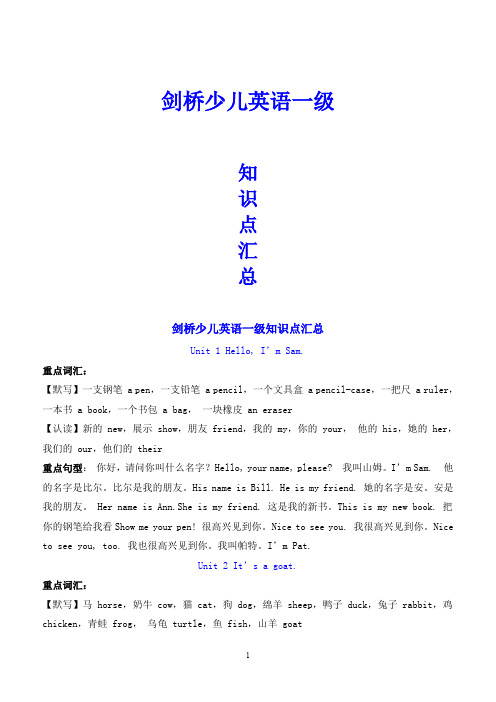
剑桥少儿英语一级知识点汇总剑桥少儿英语一级知识点汇总Unit 1 Hello, I’m Sam.重点词汇:【默写】一支钢笔 a pen,一支铅笔 a pencil,一个文具盒 a pencil-case,一把尺 a ruler,一本书 a book,一个书包 a bag,一块橡皮 an eraser【认读】新的 new,展示 show,朋友 friend,我的 my,你的 your,他的 his,她的 her,我们的 our,他们的 their重点句型:你好,请问你叫什么名字?Hello, your name, please? 我叫山姆。
I’m Sam. 他的名字是比尔。
比尔是我的朋友。
His name is Bill. He is my friend. 她的名字是安。
安是我的朋友。
Her name is Ann.She is my friend. 这是我的新书。
This is my new book. 把你的钢笔给我看Show me your pen! 很高兴见到你。
Nice to see you. 我很高兴见到你。
Nice to see you, too. 我也很高兴见到你。
我叫帕特。
I’m Pat.Unit 2 It’s a goat.重点词汇:【默写】马 horse,奶牛 cow,猫 cat,狗 dog,绵羊 sheep,鸭子 duck,兔子 rabbit,鸡chicken,青蛙 frog,乌龟 turtle,鱼 fish,山羊 goat【认读】长的 long,尾巴 tail,微笑 smile,大象 elephant,蜥蜴 lizard 重点句型:这是什么?What’s this? 这是我的猫。
This is my cat. 让我来试试。
Let me try. 它是一只山羊。
It’s a goat. 我喜爱它。
I love it.Unit 3 I like apples.重点词汇:【默写】苹果 apple-apples, pear-pears,梨香蕉 banana-bananas,菠萝pineapple-pineapples,桔子 orange-oranges ,西瓜 watermelon-watermelons ,椰子coconut-coconuts,柚子 grapefruit-grapefruits,葡萄 grape-grapes,芒果mango-mangoes,柠檬 lemon -lemons,桃子 peach-peaches,【认读】喜欢 like,想要 would like/want,一些 some,特别喜爱的 favourite,水果 fruit 重点句型:你想要什么?What would you like? 我想要一些苹果。
剑桥少儿一级各个单元重点总结
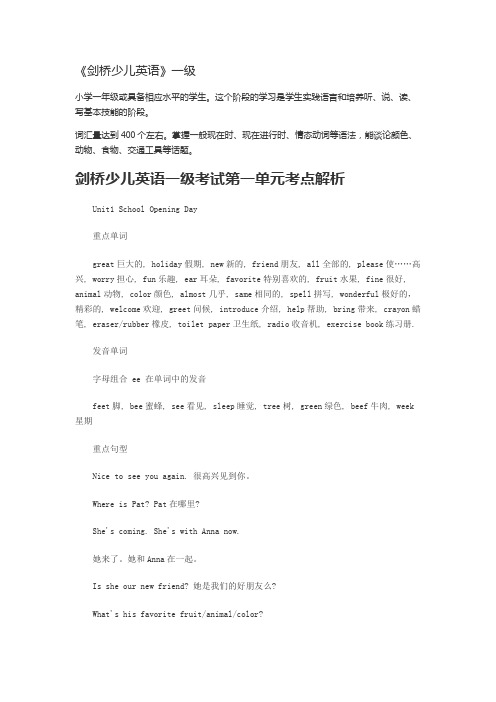
《剑桥少儿英语》一级小学一年级或具备相应水平的学生。
这个阶段的学习是学生实践语言和培养听、说、读、写基本技能的阶段。
词汇量达到400个左右。
掌握一般现在时、现在进行时、情态动词等语法,能谈论颜色、动物、食物、交通工具等话题。
剑桥少儿英语一级考试第一单元考点解析Unit1 School Opening Day重点单词great巨大的, holiday假期, new新的, friend朋友, all全部的, please使……高兴, worry担心, fun乐趣, ear耳朵, favorite特别喜欢的, fruit水果, fine很好, animal动物, color颜色, almost几乎, same相同的, spell拼写, wonderful极好的,精彩的, welcome欢迎, greet问候, introduce介绍, help帮助, bring带来, crayon蜡笔, eraser/rubber橡皮, toilet paper卫生纸, radio收音机, exercise book练习册.发音单词字母组合 ee 在单词中的发音feet脚, bee蜜蜂, see看见, sleep睡觉, tree树, green绿色, beef牛肉, week 星期重点句型Nice to see you again. 很高兴见到你。
Where is Pat? Pat在哪里?She's coming. She's with Anna now.她来了。
她和Anna在一起。
Is she our new friend? 她是我们的好朋友么?What's his favorite fruit/animal/color?他特别喜欢的水果/动物/颜色是什么?How old is she? 她多大了?会话句型It's good to see you back. 很高兴看到你回来。
How was your holiday? 你的假期怎么样?It was great! 很棒!Don't worry. Let me help you.别着急,让我来帮你。
《剑桥少儿英语一级》备考知识点.doc

《剑桥少儿英语一级》备考知识点上册Unit 1 What's your name?What's your name (please)?My name is Andy / Liu / Dehua.I am Andy / Liu / Dehua.---How old are you?--- I am 7(Yours old).Unit 2 What's this?What's this? this →(反) thatWhat's that? =>It's a …(当该句用于询问字母时,答句中无“A”,即It's “B”.)颜色的用法:①be ~: It's pink. ②~ n.: It's a pink shirt.句子陈述句This is a bag. 变疑问句把脖子提到前面去Is this a bag? Yes, it is.That is a book.Is that a book? No, it isn't.一般疑问句用yes或no来回答:Yes, it is.或No, it isn't.。
答句的最后一个词用问句的第一个词。
Unit 3 What colour do you like?颜色的用法:①be ~: It's pink. ②~ n.: It's a pink shirt.Unit 4 How many ducks are there?how many ①(多少),可数名词的数量②+ 可数名词(pl.) 复数可数名词单数→复数⑴在词尾加s。
pen → pens⑵以s, x, ch, sh结尾的词加es。
bus → buses ;box → boxes ;watch → watches ;brush → brushes⑶以辅音字母加y结尾的词,变y为i,再加es。
(y → ies) baby → babies;boy → boys⑷以f, fe结尾的词,变f, fe为v,再加es。
剑桥少儿英语一年级知识点总结
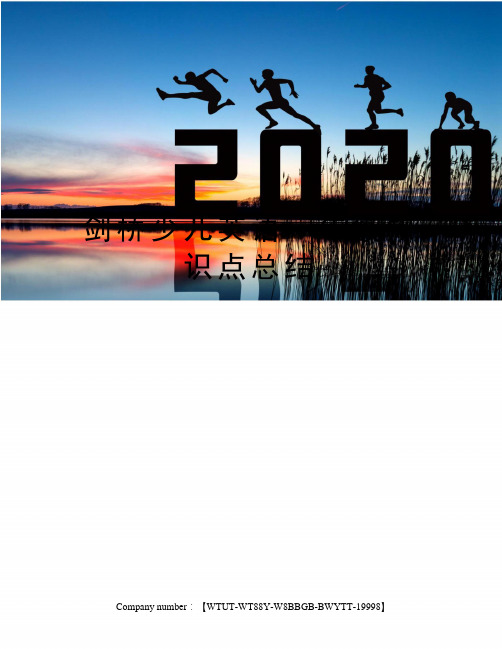
剑桥少儿英语一年级知识点总结Company number:【WTUT-WT88Y-W8BBGB-BWYTT-19998】剑桥少儿英语一级日常复习内容Unit13交际用语(会读,会对话)●Please come and show us your paper clothes.请来给我们看你们的纸衣服。
●This is my T-shirt. 这是我的T恤衫。
●These are my shorts. 这些是我的短裤。
●Is that yours 那是你的吗●Yes, this is mine. 是的,这是我的。
●It’s beautiful. 它是漂亮的。
●Which one is different 哪个是不同的重点单词(会说、会读、会默写、能理解词意)clothes衣服these这些yours你的,你们的mine我的hers她的glasses眼镜trousers裤子三会单词(会说、会读、能理解词意)paper纸group组shorts短裤chick小鸡chocolate巧克力chess象棋chin下巴cheese干酪different不同的vest背心thing东西语法知识形容词性物主代词 my我的 your你的,你们的 her她的 his他的 our我们的名词性物主代词 mine我的 yours你的,你们的 hers她的 his 他的 ours我们的形容词性物主代词 + 名词=名词性物主代词 (例)This is my dress.=This is mine. Trousers glasses shorts 等词为复数名词,表达时要用They are 或these are剑桥少儿英语一级日常复习内容交际用语(会读,会对话)●Whatis he doing 他正在做什么●He is mopping the floor. 他正在拖地。
●Here we are. 我们来了。
●Would you like to listen to my story 你想听我的故事吗●Yes, thanks a lot. 是的,非常感谢。
剑桥少儿英语一级知识点总结
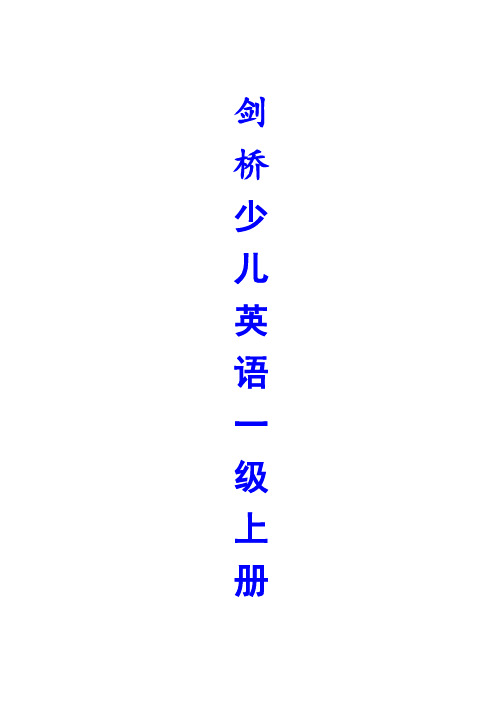
剑桥少儿英语一级上册Unit 1 Hello, I’m Sam重点词汇:Aa Bb Cc Dd Ee Ff Gg Hh Ii Jj Kk Ll Mm Nn Oo Pp Qq Rr Ss Tt Uu Vv Ww Xx Yy ZzHello你好 Hi你好 boy男孩 girl女孩 teacher老师 pen钢笔 pencil 铅笔 pencil-box铅笔盒 bag书包 ruler尺子 eraser橡皮 my我的 your 你的 his他的 her她的 its它的 our我们的 their他们的 I我 You你He他 She她 It它 We我们 They他们重点句型:1.表示问候和道别:(1)----Hello!你好!----Hello!你好!(2) ----How are you你好吗----I’m fine. 我很好.(3)----Nice to meet you!见到你很高兴!----Nice to meet you,too!见到你也很高兴!(4)----Good-bye!再见!----Bye-bye!再见!2.表示介绍:(1)介绍姓名:----What’s your name----I am/ my name is .......(2)介绍某人或某物:介绍某人 This is +人名介绍某物 This is + a/an +某物(3)表示感谢:Thanks! / Thank you! / Thank you very much!小语法知识点:★1. 人称代词口诀:我是I,你是You.男他He, 女她She.动事物它是It.我们We, 你们You他们They.物主代词口诀:我的my, 你的your,他的his, 她的her, 它的its我们的our, 你们的your, 他们的their2.中英文姓名的书写:(1)姓名如果是两个字组成,姓和名的首字母都大写。
例如:Li Ming (李明)(2)姓名如果是三个字组成,姓和名字连接的第一个字母都大写.例如:Wang Mingming (王明明)拓展练习:一.背写出二.1. ---Hello!________________---My name is Pat.A. How do you do!B. How are youC. What’s your nameD. How old are you2. ---She is my friend.----_____ name is An Qi.A. HeB. HisC. HerD. She3. ---Nice to meet you!---Nice to meet you, _______ !A. toB. twoC. too4. ---Hello, Tom! How are you---__________________.A. How are youB. Good morning.C. Thank you.D. I’m fine.5. ---Good morning, Sam.--- _____________ . BillA. Good morning.B. Good bye!C. How are you谚语:L o v e m e,L o v e m y d o g.爱屋及乌Unit 2. It’s a goat重点词汇:goat山羊turtle 乌龟chicken小鸡rabbit兔子frog青蛙lizard蜥蜴 duck鸭子 cat小猫 sheep绵羊 dog小狗 horse马 fish鱼cow牛 here这儿 there那儿重点句型:1.表示询问是什么东西What’s this / What is it这是什么----It’s a / an ...这是一个......2. 表示疑问Is this / it a cat这是一只猫吗----Yes, it is / No, it isn’t 是的,它是/不,它不是小语法知识点:不定冠词a / an的用法:an 用在元音字母(a,e,i,o,u)开头前,a 用在辅音字母开头前.拓展练习:用a / an 来填空1. _______ apple2. ________ cat3. _______ banana4. ________ dog5. _______ fish6. _________orange7. _______ cow 8. _________ pear谚语:Time is money. 时间就是金钱.U3 What would you like重点词汇:pear梨 apple苹果 pineapple菠萝 watermelon 西瓜 grape葡萄 peach桃子tomato西红柿 banana香蕉 orange桔子 would like想要 how many多少 have got有了解单词:grapefruit柚子 coconut椰子 mango芒果 lemon柠檬重点句型:1. 表示询问某人想要什么:What would you like 你想要些什么----I would like some apples. 我想要一些苹果.2. 表示某人是否想要某物:Would you like an apple 你想要一个苹果吗----Yes, please. / No, thank you. 是的,请给我一个/ 不,谢谢3.表示询问数量:How many apples do you want 你想要多少个苹果----I want two. 我想要两个.4. 表示询问某人最喜欢什么水果:What’s your favourite fruit 你最喜欢的水果是什么----My favourite fruit is...... 我最喜欢的水果是...小语法知识点:可数名词单数变复数规则:1.一般情况下,在名词后直接加s. 例如apple--apples2.以s, x, ch, sh结尾的名词加es. 例如 bus---busesbox---boxes watch---watches.3.以辅音+y结尾的名词变y为i+es 例如:baby---babies4.以f / fe 结尾的名词变f / fe 为v+es. 例如:leaf---leaves不规则变化:1. 男人man, 女人woman(a变e) ------men, women2. 孩子child 变成孩子们后+ ren------children3. 金刚不变 fish和sheep4. 面目全非 mouse变mice5. oo变ee tooth---teeth foot---feet5. 黑人,英雄爱吃土豆(potato)和西红柿(tomato)+es拓展练习:一.写出下列名词的复数形式1. child__________2. fish_________3. girl___________4. woman_________5. tooth__________6. peach________7. bus____________ 8. tomato__________9. leaf____________二. 选择题1. I _________ apple juice, but I _________ orange juice.A. Like, don’t likeB. Like, likeC. don’t like, don’t like2. What ________ you likeA. doesB. areC. Would3. Would you like an appleA. Yes, pleaseB. No, thankC. Yes, thanks谚语:A good book is a good friend. 好书如挚友U4. What’s in my hat (我的帽子里有什么)重点词汇:desk桌子 turtle乌龟 clock闹钟 pig猪 fish鱼 baseball棒球 hat 帽子 bird鸟 watch手表 on在...上面 in在...里面 on the table在桌子上 in the bag在书包里重点句型:1.询问某地有什么东西:what is on the table 桌子上有什么----A turtle 有一只乌龟.What is in my bag书包里有什么----It is a pen. 有一支钢笔2. 介绍朋友:this \ that is.....这是/那是......小语法知识:介词: on 在......上under在......下面in在.......里面“颜”外之意(一)black黑色------black dog 沮丧 black tea 红茶Unit 5 my body and the monster’s重点词汇:hair头发 eye眼睛 ear耳朵 neck脖子 foot脚 hand手head头 nose鼻子 mouth嘴 arm胳膊 leg腿 face脸 knee膝盖shoulder肩膀 finger手指 turn left左转 turn right右转touch your head摸摸你的头 stamp your foot跺跺你的脚clap your hands拍拍你的手 wash your face洗脸brush your teeth刷牙重点句型:1.询问是什么东西:What’s this 这是什么---It’s a nose. 它是一个鼻子.2. 询问五官能干什么What can you see你能看见什么----- I can see a book.我能看见一本书.What can you hear你能听见什么------I can hear a car.我能听见小汽车声.4.谈论五官的功能:We can see with our eyes. 我们能用眼睛看.We can hear with our ears. 我们能用耳朵听.We can smell with our noses. 我们能用鼻子闻.We can taste with our tongues. 我们能用舌头尝.We can touch with our hands. 我们能用手摸.小语法知识:1. 情态动词“can”,表示能/会. 没有人称和数的变化,后面永远接动词原形.2. Have/has 的用法(当主语是第三人称单数时用has, 其余用have)(1)表示某人拥有某物. 例如:I have a book.(2)表示吃,喝. 例如:have some bread.(3)表示“进行,举行”.例如:have a meeting.(4)固定搭配“have+三餐”.例如:have breakfast/ have lunch/ have supper(dinner)拓展练习:1.写出相对应的身体部位.2.小作文(介绍自己)Hello, my name is lily/Sam. I am a girl/boy. I am ten years old.I have two big eyes. one small nose and one small mouth. I like red and blue. This is me. Do you like me“颜”外之意(二)white 白色white lie 善意的谎言 A white night 一个不眠之夜U6 Let’s play games重点词汇:want想要 draw画画 put放 pick捡 play games玩游戏 bounce the ball 排球 Kick踢 catch抓住重点句型:1.询问某人在某地Where +be(am, is are)+姓名----姓名+be+地点.例如: Where is Sam ------He is in the house.2.Be 动词的用法:Be 动词真伟大,生出am is are.我(I)用am, 你(you) 用are.is 跟着他(he),她(she),它(it).我们(we),他们(they)也用are.★拓展练习:用be 动词(am, is, are)填空.(1)I _______ a girl. (2) She ________ Danny.(3) He ________ a boy. (4) It _________ a dog.(5) We ________ friends (6) They_______ teachers.(7) Li Ming_________ a student.(8) Jenny and Danny_______good friends.“颜”外之意(三)yellow 黄色A yellow dog 卑鄙小人 a yellow card 黄牌U7 Fruit and vegetables Party重点词汇:potato土豆 bean豆角 carrot胡萝卜 orange 桔子 tomato西红柿 Mr.先生 Mrs.夫人 Miss.小姐/女士 have a party举行晚会 go away走开 up and down上上下下go home回家 on the tree(长在树上) in the tree(存在树上)了解词汇:lemon柠檬 lime酸橙重点句型:one do you like, the banana or the apple你喜欢香蕉还是苹果-----I like the banana.我喜欢香蕉.2. Where is my watermelon 我的西瓜在哪里------ Here I am. 我在这儿.小语法知识:选择疑问句:一般疑问句+ or +被选择情况------ 根据情况选一种回答.“颜”外之意(四)green绿色green hand 新手 green tea 绿茶U8. Colours around us重点词汇:blue蓝色 green绿色 red红色 yellow黄色 brown棕色 white白色 black 黑色 purple紫色 pink粉色 gray 灰色 truck 卡车 lorry a lotof(=lots of)许多 have a look看一看 have got有重点句型:1.询问物品的颜色What colour is it它是什么颜色-----It is red.它是红色.2. 询问是否喜欢某种颜色Do you like red你喜欢红色吗-----Yes, I do/ No, I don’t. 是的,我喜欢/ 不是,我不喜欢3.询问喜欢什么颜色what colour do you like你喜欢什么颜色------ I like red. 我喜欢红色.小语法知识:1. It的用法(1)用来指代前面所提到的人或物.例如:I like this dress. I want to buy it.(2) 用来代替指示代词this/ that.例如:What’s this----- It’s a cat.(3) 可用来表示时间,距离,天气,数字等例如:What’s the time(=What time is it)-----It’s five o’clock.. white. brown. green.首字母大写时可作姓氏.Mr. Black 布莱克先生 Mr. White 怀特先生Mr. Brown 布朗先生格林先生题型拓展:1.连线Red apple 黄色的柠檬Green pear 蓝色的天空Yellow lemon 红色的苹果Brown bear 黑色的绵羊Blue sky 绿色的梨Black sheep 棕色的熊2.实际情况回答问题(1) What’s your favourite colour_______________________(2) What’s your favouite clothes_______________________(3) What’s your favourite food_________________________日常口语: You are a lucky dog. 你是个幸运儿.U9 Where is my toy car重点词汇:bike自行车 bus公共汽车 car小汽车 taxi出租车 plane飞机 ship轮船train火车 motorbike摩托车 boat小船 on在......上面 in在......里面 under在.....下面 behind在….后面 next to在......旁边(in front of在.......前面 near在…..附近 far from离…很远)重点句型:1.询问某物在某地Where is my toy car 我的玩具车在哪里-----It’s under the table. 它在桌子底下.2.询问数量(不可数名词或价格how much, 可数名词复数how many)例如:How much is the book 这本书多少钱-----It’s 5 yuan. 5元3.询问某人是否有某物Have you got a toy car 你有玩具车吗----- Yes, I have./ No, I haven’t 是的,我有/ 不,我没有.4.询问怎样去哪里(交通方式)How do you go to school 你怎样去学校-----I go to school by bus. 我乘公共汽车去学校.小语法只是点:much 与 How many的区别How much 询问“多少钱”,也可询问“多少”(不可数名词)How many 询问“多少”(接可数名词复数)2. 乘坐某种交通方式用介词by+ 交通工具,但是“步行”用on foot拓展练习:is a big apple tree_________ (在......前面)my house.pencil is __________ (在......里面)the pencil-case.is a cat_________ (在......下面)the tree.is a book __________ (在......上面)the table.Unit 10 An easy maths lesson重点词汇:one two three four five six seven eight nine ten eleven twelve thirteen fourteen fifteen sixteen seventeen eighteen nineteen twenty20 —— 90(整数)都以ty 结尾:twenty thirty forty fiftySixty seventy eighty ninety几十几:(几十和几中间要用连字符—连接)例如: twenty-one重点句型:many books do you have你有几本书------ I have two books. 我有两本.2. Five minus two is three.(5-2=3)One plus one is two.(1+1=2)拓展练习:four=________ 2. One+three=_________3. Three+two=__________4. Eight-one=___________5. Six-two=___________6. One+four=___________7. Ten-six=___________ 8. Three+five=__________U11 our family tree重点词汇:mother妈妈 father爸爸 grandfather爷爷 grandmother奶奶 me我 brother 兄弟 sister姐妹cousin堂兄妹 niece侄子、侄女 nephew外甥女、外甥uncle叔叔 aunt阿姨 daughter女儿 son儿子read(ing )a book读书 read(ing) a newspaper看报 eat(ing) fish吃鱼watch(ing) TV看电视 drink(ing) tea喝茶 hold(ing) a doll拿布娃娃重点句型:is she她是谁----She is my mother. 她是我的妈妈.2. Who is he他是谁----He is my father. 他是我的爸爸.are you doing 你正在干什么----I am reading a book. 我正在读书.4. What is he/ she doing 他/她正在干什么----He/she is drinking tea. 他/她正在喝茶.U12 Let’s make friends重点词汇:bike-riding骑车 roller-skating滑冰 drinking喝 swimming游泳Singing唱 reading读 sleeping睡觉 writing写 drawing画Go shopping去购物 listening to music听音乐 flying a kite放风筝Talk with和…谈话 do homework做家庭作业 play computer games玩电脑游戏 Play soccer踢足球重点句型:1.What’s your hoppy你的爱好是什么-----I like bike-riding. 我喜欢骑车.2. What does she like doing她喜欢干什么----- She likes swimming. 她喜欢游泳.3. What is it 它是什么-----It’s a/ an.......它是一个........小语法知识点:Like 的用法:Like当“动词”讲时——like to do sth/ like doing sth 喜欢做某事Like 当“介词”讲时——look like 看起来像饮料的英文表达:white coffee 牛奶咖啡U13. Paper clothes show★重点词汇:Shirt衬衫 dress连衣裙 skirt短裙 jacket夹克 hat帽子 T-shirt T恤socks袜子 glasses眼镜 trousers裤子 shorts短裤 sweater毛衣glovers手套 this这个 that那个 these这些 those那些重点句型:1.介绍自己的衣着This is a+单数. (这是我的......)例如:This is my dress.These are +复数. (这些是我的.......)例如:These are my dresses.This is a pair of.......这是一双/一副......2. 询问某物是否属于某人Is this yours 这是你的吗---Yes, It ’s mine./ No, It ’s not mine. 是的,是我的/ 不,不是我的3. 询问某人穿着什么衣服What is she/he wearing 她/他穿的什么---She ’s/He ’s wearing a T-shirt. 她/他穿了一件T 恤.4.询问某人是否喜欢的衣服Do you like my dress 你喜欢我的连衣裙--- Yes, I do./ No, I don ’t 是的,我喜欢/ 不,我不喜欢小语法知识点:1. 名词性物主代词Wear 表示穿着“状态”,可用于进行时态.Put on 表示“穿”的动作.Be in +颜色 / 衣服,也表示“状态”4. 单数句型变复数句型.遵循一一对应的变化 例如:This is a book.These are many books.U14 Let ’s help the old理解词汇:tidying the books整理书 feeding the bird喂鸟mopping the floor拖地 cleaning the window擦窗户combing hair梳头 making the tea 端茶feeding the dog喂狗 washing the tomatoes 洗西红柿reading a story book 读故事书重点句型:is he / she doing他/她正在干什么--- He/ She is swimming.他/她正在游泳.2. Would you like to listen to my story你想听故事吗--- Yes, please./ No, thanks.是的/不,谢谢!小语法知识点:复习现在进行时态(规则及不规则)1.询问某人正在干某事.What is he/ she doing他/她正在干什么--- He/She is mopping the floor.他/她正在拖地.2.询问某人是否想要做某事.Would you like to listen to my story你想听故事吗--- Yes, please./ No, thanks.是的/不,谢谢!3.询问某人是否想要某物.Would you like a cup of tea 你想要杯茶吗---Yes, please./ No, thanks.是的/不,谢谢!4.询问某人能做某事What can you do你会做什么--- I can feed the dog.我会喂小狗.5. 感谢某人的问与答Thanks very much.非常感谢!---You are welcome.不客气!小语法知识点:1.现在进行时态——表示现在正在发生的动作或事情.句子结构:肯定句——主语+Be(am, is, are)+现在分词+.....否定句——主语+ be+not+现在分词+........一般疑问句——Be+主语+现在分词+........2. 动词变现在分词规则:(1)一般情况下在动词后直接+ing 例如:do— doing(2) 以不发音的e结尾的,去e +ing 例如:have— having(3) 以重读闭音节结尾(一个元音+一个辅音结尾)的,双写末尾辅音+ing(aw,ay结尾除外)例如:swim—— swimming2. 现在进行进行时态口诀:主语在句首,am/is/are 跟其后,现在分词跟着走,其他成分不可丢;表动作正在进行时,句中now时态定,一般疑问Be提前,否定其后加not.拓展练习:写出下列单词的现在分词1.drink—2. swim—3.read—4. sing—5.write—6. sleep—7.draw— 8. ride—9.fly— 10. play—U15. A birthday party重点词汇:present(gift)礼物 bounce拍 sleep睡觉 singing唱 fishing钓鱼 blowing ballons吹气球 put...in把...放进...里面 put...on把...放在...上面(穿上) happy new year 新年快乐重点句型:1. Who are you你是谁--- I am + 人名.我是…..2. Who is he/ she他/她是谁---He / She is +姓名.他/她是…..3. 询问某人将要去某地.Where is he/ she going to .......他/她打算去哪里---He / She is going to +地点.他/她打算去……4. 询问交通工具How will he / she go there他/她怎样去那儿--- He/She will go +地点+by+交通工具.他/她坐….去…..小语法知识:1. 乘坐交通工具用介词(by+交通工具). 例如:by bus. by plane.2. 在节日前用介词“on”. 例如:on Children’s DayU16 An English Evening重点词汇:fall摔到 asleep睡着的 wall墙 quietly安静地 cook做饭 welcome to.... 欢迎来到.... climb up......爬上去 get down下来pull...out... 把...拔出来 come on 过来 have fun玩的高兴重点句型:1. 询问你的姓名.What’s your name你叫什么名字--- My name is......我叫…..2. 询问你的年龄.How old are you你几岁了--- I am +年龄.我…了3. 询问你住在哪里.Where do you live你住在哪里---I live in +地点.我住在…..4. 询问乘坐某种交通工具How do you go to school 你怎样去学校--- I go to school by bike.我坐自行车去学校.5. 询问某人最喜欢什么颜色/ 水果/ 食物What’s your favourite colour/ fruit/ food--- My favourite colour / fruit/ food is .......6. 询问谁是你最好的朋友Who is your best friend---My best friend is ......7. 询问你有什么东西What have you got--- I have got a book.小语法知识点:(了解)感叹句---引导词how与what的用法区别:How +形容词/ 副词(+ 主语+谓语)! 例如:How clever he is!What +a/an +形容词+名词(+主语+谓语)!例如:What a lovely girl.小作文:我的家庭My familyI have a happy family. My father is a teacher, He is tall. My mother is a doctor, She is a tall, too. I am a student, I am short. I love my father and mother, They love me, too!。
《剑桥少儿英语一级》备考知识点.pdf
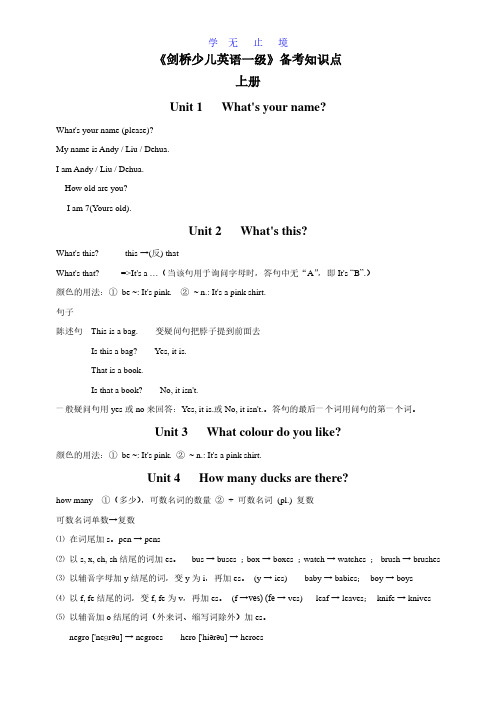
《剑桥少儿英语一级》备考知识点上册Unit 1 What's your name?What's your name (please)?My name is Andy / Liu / Dehua.I am Andy / Liu / Dehua.---How old are you?--- I am 7(Yours old).Unit 2 What's this?What's this? this →(反) thatWhat's that? =>It's a …(当该句用于询问字母时,答句中无“A”,即It's “B”.)颜色的用法:①be ~: It's pink. ②~ n.: It's a pink shirt.句子陈述句This is a bag. 变疑问句把脖子提到前面去Is this a bag? Yes, it is.That is a book.Is that a book? No, it isn't.一般疑问句用yes或no来回答:Yes, it is.或No, it isn't.。
答句的最后一个词用问句的第一个词。
Unit 3 What colour do you like?颜色的用法:①be ~: It's pink. ②~ n.: It's a pink shirt.Unit 4 How many ducks are there?how many ①(多少),可数名词的数量②+ 可数名词(pl.) 复数可数名词单数→复数⑴在词尾加s。
pen → pens⑵以s, x, ch, sh结尾的词加es。
bus → buses ;box → boxes ;watch → watches ;brush → brushes⑶以辅音字母加y结尾的词,变y为i,再加es。
(y → ies) baby → babies;boy → boys⑷以f, fe结尾的词,变f, fe为v,再加es。
2023年剑桥少儿英语一级考级复习重点

动词ing动词ing的变化规则1. 一般情况下直接在动词后加ingplay-----playing read-----reading2. 动词是以辅元辅结构结尾的重读闭音节,双写最后一个字母,再加ingswim-----swimming run------running3. 动词以不发音的e结尾的,去掉e,再加ingride-----riding write------writing练习:watch----- drink----- hold-----eat----- water----- tidy-----feed----- mop----- clean-----make----- wash----- fish-----blow----- go----- do-----jump----- catch----- hop-----sit----- kick----- listen-----paint----- fly----- draw-----现在进行时现在进行时的定义:现在进行时表达现在或当前一般时间正在进行的动作。
现在进行时的构成是: be(am/is/are)+动词ing (be为助动词,应与主语的人称和数保持一致,同学们最容易漏掉)1. I am swimming. 我正在游泳2. She is eating cakes. 她正在吃蛋糕3. We are playing football. 我们正在打篮球注意:问句用doing提问,答句用动词ing回答。
如:What's the boy doing? watering the flowers.(浇花)翻译:1.The boy is playing basketball.2.They are singing in the classroom.3.I‘m reading a book.4.What's the man holding?5.What's the children playing?6.Who is the girl talking with?7.Where is the boy swimming?8.How many birds are singing?9.What's he drawing?10.Is Tom playing the guitar?介词剑桥一级重要考察方位介词的用法: in在……里on 在……上under 在……下between在……之间behind在……后in front of在……前next to /near 在……旁边介词的考察通常出现在听力题的1题和5题中。
剑桥少儿英语一级上册各单元知识点汇总
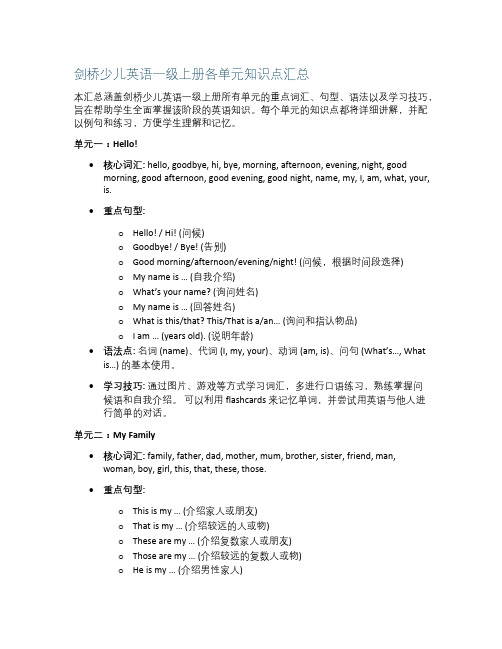
剑桥少儿英语一级上册各单元知识点汇总本汇总涵盖剑桥少儿英语一级上册所有单元的重点词汇、句型、语法以及学习技巧,旨在帮助学生全面掌握该阶段的英语知识。
每个单元的知识点都将详细讲解,并配以例句和练习,方便学生理解和记忆。
单元一:Hello!•核心词汇: hello, goodbye, hi, bye, morning, afternoon, evening, night, good morning, good afternoon, good evening, good night, name, my, I, am, what, your, is.•重点句型:o Hello! / Hi! (问候)o Goodbye! / Bye! (告别)o Good morning/afternoon/evening/night! (问候,根据时间段选择)o My name is … (自我介绍)o What’s your name? (询问姓名)o My name is … (回答姓名)o What is this/that? This/That is a/an… (询问和指认物品)o I am … (years old). (说明年龄)•语法点:名词 (name)、代词 (I, my, your)、动词 (am, is)、问句(What’s…, What is…) 的基本使用。
•学习技巧:通过图片、游戏等方式学习词汇,多进行口语练习,熟练掌握问候语和自我介绍。
可以利用 flashcards 来记忆单词,并尝试用英语与他人进行简单的对话。
单元二:My Family•核心词汇: family, father, dad, mother, mum, brother, sister, friend, man, woman, boy, girl, this, that, these, those.•重点句型:o This is my … (介绍家人或朋友)o That is my … (介绍较远的人或物)o These are my … (介绍复数家人或朋友)o Those are my … (介绍较远的复数人或物)o He is my … (介绍男性家人)o She is my … (介绍女性家人)•语法点:名词的单复数 (family/families, brother/brothers),指示代词 (this, that, these, those) 的使用,人称代词 (he, she) 的引入。
剑桥少儿英语一级需要掌握的知识
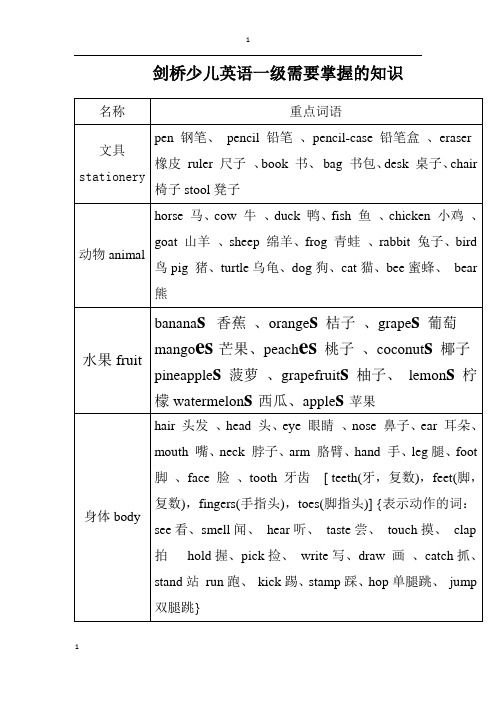
3.Take a seat.
4. Is that your grandma?
4. She is watering the flowers now.
Come and show us your family photo.
第十二单元Let’s make friends
蔬菜 vegetable
potato土豆、tomato西红柿、carrot胡萝卜onion洋葱、sausage香肠、bean豆角、chips薯条pumpkin南瓜、cucumber黄瓜
数数count
one 1、two 2、three 3、four 4、five 5、six 6、seven7 eight 8、nine 9、ten 10、plus加、minus减
6. I’ll clean the kitchen.
第十五单元
A Happy New Year
1. Who is he? He is…
2. You are Li Ming.
3. Happy New Year!
4. How long is your snake?
第十六单元
An English Evening
1.Wow! What a big turnip!
2. I can’t pull it out.
3. Let me help you.
4. No problem.
5. Let’s do it
剑桥少儿英语一级需要掌握的知识
句子练习
This is my new book! 这是我的新书。
Nice to see you. 见到你很高兴
4.附加---What’s your favourite fruit?(你最喜欢的水果是?)
2023年剑桥少儿英语一级知识点总结

Unit13交际用语(会读,会对话)●Please come and show us your paper clothes.请来给我们看你们的纸衣服。
●This is my T-shirt. 这是我的T恤衫。
●These are my shorts. 这些是我的短裤。
●Is that yours? 那是你的吗?●Yes, this is mine. 是的,这是我的。
●It’s beautiful. 它是美丽的。
●Which one is different? 哪个是不同的?重点单词(会说、会读、会默写、能理解词意)clothes衣服these这些yours你的,你们的mine我的hers她的glasses眼镜trousers裤子三会单词(会说、会读、能理解词意)paper纸group组shorts短裤chick小鸡chocolate巧克力chess象棋chin下巴cheese干酪different不同的vest背心thing东西语法知识形容词性物主代词 my我的 your你的,你们的 her她的 his他的 our我们的名词性物主代词 mine我的 yours你的,你们的 hers她的 his 他的 ours我们的形容词性物主代词 + 名词=名词性物主代词 (例)This is my dress.=This is mine.Trousers glasses shorts 等词为复数名词,表达时要用They are 或these areUnit14交际用语(会读,会对话)●Whatis he doing?他正在做什么?●He is mopping the floor. 他正在拖地。
●Here we are. 我们来了。
●Would you like to listen to my story? 你想听我的故事吗?●Yes, thanks a lot. 是的,非常感谢。
●Would you like a cup of tea? 你想喝杯茶吗?●I’ll clean the kitchen. 我要去擦厨房。
- 1、下载文档前请自行甄别文档内容的完整性,平台不提供额外的编辑、内容补充、找答案等附加服务。
- 2、"仅部分预览"的文档,不可在线预览部分如存在完整性等问题,可反馈申请退款(可完整预览的文档不适用该条件!)。
- 3、如文档侵犯您的权益,请联系客服反馈,我们会尽快为您处理(人工客服工作时间:9:00-18:30)。
上册Unit 1 What's your name?●What's your name (please)?My name is Andy / Liu / Dehua.I am Andy / Liu / Dehua.●---How old are you? --- I am 7(Yours old).Unit 2 What's this?●What's this? this →(反) thatWhat's that? =>It's a …(当该句用于询问字母时,答句中无“A”,即It's “B”.)●颜色的用法:①be ~: It's pink. ②~ n.: It's a pink shirt.●句子陈述句This is a bag. 变疑问句把脖子提到前面去Is this a bag? Yes, it is.That is a book.Is that a book? No, it isn't.一般疑问句用yes或no来回答:Yes, it is.或No, it isn't.。
答句的最后一个词用问句的第一个词。
Unit 3 What colour do you like?●颜色的用法:①be ~: It's pink. ②~ n.: It's a pink shirt.Unit 4 How many ducks are there?●how many ①(多少),可数名词的数量②+ 可数名词(pl.) 复数●可数名词单数→复数⑴在词尾加s。
pen → pens⑵以s, x, ch, sh结尾的词加es。
bus → buses ;box → boxes ;watch → watches ;brush → brushes⑶以辅音字母加y结尾的词,变y为i,再加es。
(y → ies) baby → babies;boy → boys⑷以f, fe结尾的词,变f, fe为v,再加es。
(f →ves) (fe→ ves) leaf → leaves;knife → knives⑸以辅音加o结尾的词(外来词、缩写词除外)加es。
negro ['neɡrəu] → negroes hero ['hiərəu] → heroespotato → potatoes tomato → tomatoes mango → mangoes一个黑人英雄坐在土豆地里,手里拿着西红柿吃芒果,多有意思。
(es)下列词除外,photo → photos kilo → kilos⑹特殊变化:①oo → ee foot → feet tooth → teeth goose → geese②a → e man → men woman → women ['wimin]③mouse → mice ;louse → lice④sheep →不变;deer →不变people → +s peoples 民族不变people 人fish → 不变或加es fish 或fishes⑤child → children ox → oxen●有have 某人有某物there be 某处有某物there is (are) + 存在物+ [存在的地点]There is a pen on the desk. 桌子上有笔。
There are two boys in the classroom. 教室里有两个男孩。
Unit 5 Have you got any fish?●①have [hæv] 有I have a book. ;have got 有I have got a book.②some [sʌm] 一些I have got some books. ;any ['eni] 一些Have you got any books?some 用于肯定句;any用于疑问句,否定句。
Unit 6 Has he got a teddy bear?●单三形式:单数的第三人称或第三人称单数形式第一人称→我,我们;第二人称→你,你们;第三人称→他,他们人名和物名(我的书)单三主语有:she, he, it, Rose(单独的人名) the book(物名)等。
如果句子中出现单三形式,have →变hasShe has a book. 她有一本书。
例如(e.g.):第一人称I have got a chair.→变问句--- Have you got a chair? --- Yes, I have. / No, I haven't.→变否定句I haven't got a chair.第三人称She has got a book. 她有一本书。
→变问句---Has she got a book? 她有一本书吗?--- Yes, she has. / No, she hasn't.→变否定句She hasn't got a book.Unit 7 Our family●revision:⑴What's your name? My name is… / I'm…⑵How old are you? I'm…years old.⑶---How many pencils are there in the pencil-box. ---There's 1./ There are 2.⑷What's this? It's a…⑸How old is your father? He's 36.⑹What colour is it? It's…What colour(s) are they? They are…⑺How many people are there in your family?⑻What are these? They're…⑼Which is the pen? This is the pen.⑽Have you got a…? Yes, I have. / No, I haven't.Has he got a…? Yes, he has. / No, he hasn't.⑾This is a pen. → (变复数形式) These are some pens.Unit 9 What's your favourite fruit?●favourite [fei'vəreit] adj.最喜爱的My favourite food.n.最喜欢的(人或物)My favourite is my mother. 我最喜欢的人是妈妈。
前面用“某人的”e.g.: your favourite bookUnit 10 Do you want an orange or a pear?●too 也There's an egg, too. (句末)also 也They also love me. (句中be ~ ~ v.)too用于句末;also用于句中,用在be动词后面,实动词前面,一句当中动词最重要。
I am a teacher, too. / I am also a teacher. / I also like English.⑷a, an 一个 a 用在辅音音标开头词前an 用在元音音标开头词前a pear;a university [ֽju:ni'vɜ:səti] 大学;an apple;an hour [əuə] 小时Unit 13 What's for breakfast?8. What's for breakfast on…?Monday 星期一Tuesday 星期二Wednesday 星期三Thursday 星期四Friday 星期五Saturday 星期六Sunday 星期日=> ①首字母大写②无冠词the ③on ~ 在……④What day is it today? 今天星期几?It's Sunday. 今天星期日=> ---What's for breakfast on Monday?--- I have burger for... breakfast on.. Monday.Unit 14 By bus or by bike?7. 特殊疑问句,需要用具体内容来回答。
结构:以wh~ 开头(特殊疑问词)+ 一般疑问句+ ?题型:就划线部分提问。
答题步骤:①找到划线部分对应的特殊疑问词。
(寻找)如:My name is Angel. → (what)特殊疑问词有what 什么(代事物);who 谁(代人物)whose 谁的(代人物的);where 哪里(代地点)when 什么时候(代时间);which 哪一个(代特征)why 为什么(代原因);how 怎样(代方式)②将原句变成一般疑问句。
(改变)③两者加合(疑问词+ 一般疑问句),去掉划线部分。
e.g.: I go to school by bus.①how②Do you go to school by bus? ③How do you go to school?The book is on the desk.①where②Is the book on the desk?③Where is the book?Unit 15 We love animals.●love [lʌv] v.喜爱;like v.喜欢①~ + n.(单/复数)e.g.: I like / love books.;I like / love the book. ;I love / like Miss Yang.②~ + doing I like / love playing football.to do I love / like to play football.下册Unit 1 What's your name?●I can see hens on the farm. (A: in B: at C: on)表示“在农场上”最佳介词“on”。
farm → farmer ;What's on the farm? → There are many animals.Unit 3 Where's the cat?●表示位置的介词:in, on, under, behind, between(两者之间);next to(挨着……),in front of(范围之外的前边);in the front of(范围之内的前边),Unit 4 Please have some cake.●祈使句特点:①无主语②动词原形开头③表示了对对方的命令,意愿,请求肯定:Stand up. Go out.否定:Don't 开头Don't stand up.Unit 5 This is our house.●How many rooms are there in your house? 你家有多少间房间?有:there be 句式翻译成(有)。
